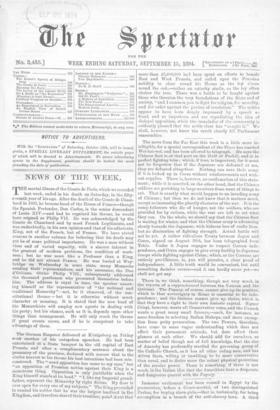NEWS OF THE WEEK.
THE mortal illness of the Comte de Paris, which we recorded last week, ended in his death on Saturday, in the fifty- esventh year of his age. After the death of the Comte de Chain- bord in 1883, he became head of the House of France—though the Spanish Pretender, Don Carlos, is the senior descendant of Louis XIV.—and had he regained his throne, he would have reigned as Philip VII. He was acknowledged by the Comte de Chambord and by most French Legitimists, and was undoubtedly, in his own opinion and that of his adherents, King, not of the French, but of France. We have stated reasons in another column for believing that his death may yet be of some political importance. He was a man without vices and of varied capacity, with a sincere interest in the greatest of modern problems, the condition of work- men ; but he was more like a Professor than a King, and he did not attract France. He was buried at Wey- bridge on Wednesday in some state, many Monarchs sending their representatives, and his successor, the Duel d'Orl6ans, titular Philip VIII., subsequently addressed the thousand gentlemen who presented themselves before him. The address is royal in tone, the speaker assert- ing himself as the representative of "the national and traditional Monarchy "—not, be it observed, of the con- stitutional throne—but it is otherwise without much character or meaning. It is stated that the new head of the Monarchists will employ new agents in dealing with his party; but his chance, such as it is, depends upon other things than management. He will only reach the throne if great events occur, and if he is competent to take advantage of them.


































